- Home
- Mary Stewart
The Crystal Cave Page 13
The Crystal Cave Read online
Page 13
The young man paused. I saw him now, clearly, as the shadow lifted. He was tall and strongly built, and his hair looked bleached in the starlight. He wore some sort of foreign dress — trousers cross-bound with thongs below a tunic girded low on the hips, and a high loose cap. Under this the fair hair blew round his face like rays. There was a rope in his hand, held loosely, its coils brushing the frost. His cloak flew in the wind; a short cloak, of some dark colour I could not make out.
His cloak? Then it could not be my young lord. And after all, why should that arrogant young man come with a rope to catch a bull that had strayed in the night?
Without warning, and without a sound, the white bull charged. Shadow and light rushed with it, flickering, blurring the scene. The rope whirled, snaked into a loop, settled. The man leapt to one side as the great beast tore past him and came to a sliding stop with the rope snapping taut and the frost smoking up in clouds from the side-slipping hoofs.
The bull whirled, and charged again. The man waited without moving, his feet planted slightly apart, his posture casual, almost disdainful. As the bull reached him he seemed to sway aside, lightly, like a dancer. The bull went by him so close that I saw a horn shear the swirling cloak, and the beast's shoulder passed the man's thigh like a lover seeking a caress. The man's hands moved. The rope whipped up into a ring, and another loop settled round the royal horns. The man leaned against it, and as the beast came up short once more, turning sharp in its own smoke, the man jumped.
Not away. Towards the bull, clean on to the thick neck, with knees digging into the dewlap, and fierce hands using the rope like reins.
The bull stopped dead, his feet four-square, his head thrust downwards with his whole weight and strength against the rope. There was still no sound that I could hear, no sound of hoof or crack of rope or bellow of breath. I was half out of the brushwood now, rigid and staring, heedless of anything save the fight between man and bull.
A cloud stamped the field again with darkness. I got to my feet. I believe I meant to seize the plank from the shed and rush with it across the field to give what futile help I could. But before I could move the cloud had fled, to show me the bull standing as before, the man still on its neck. But now the beast's head was coming up. The man had dropped the rope, and his two hands were on the bull's horns, dragging them back... back... up... Slowly, almost as if in a ritual of surrender, the bull's head lifted, the powerful neck stretched up, exposed.
There was a gleam in the man's right hand. He leaned forward, then drove the knife down and across.
Still in silence, slowly, the bull sank to its knees. Black flowed over the white hide, the white ground, the white base of the stone.
I broke from my hiding place and ran, shouting something — I have no idea what — across the field towards them.
I don't know what I meant to do. The man saw me coming, and turned his head, and I saw that nothing was needed. He was smiling, but his face in the starlight seemed curiously smooth and unhuman in its lack of expression. I could see no sign of stress or effort. His eyes were expressionless too, cold and dark, with no smile there.
I stumbled, tried to stop, caught my feet in the trailing cloak, and fell, rolling in a ridiculous and helpless bundle towards him, just as the white bull, slowly heeling over, collapsed. Something struck me on the side of the head. I heard a sharp childish sound which was myself crying out, then it was dark.
4
SOMEONE KICKED ME AGAIN, HARD, in the ribs. I grunted and rolled, trying to get out of range, but the cloak hampered me. A torch, stinking with black smoke, was thrust down, almost into my face. The familiar young voice said, angrily: "My cloak, by God! Grab hold of him, you, quick. I'm damned if I touch him, he's filthy."
They were all round me, feet scuffling the frost, torches flaring, men's voices curious, or angry, or indifferently amused. Some were mounted, and their horses skirmished on the edge of the group, stamping and fidgeting with cold.
I crouched, blinking upwards. My head ached, and the flickering scene above me swam unreal, in snatches, as if reality and dream were breaking and dovetailing one across the other to split the senses. Fire, voices, the rocking of a ship, the white bull falling...
A hand tore the cloak off me. Some of the rotten sacking went with it, leaving me with a shoulder and side bare to the waist. Someone grabbed my wrist and yanked me to my feet and held me. His other hand took me roughly by the hair, and pulled my head up to face the man who stood over me. He was tall, young, with light brown hair showing reddish in the torchlight, and an elegant beard fringing his chin. His eyes were blue, and looked angry. He was cloakless in the cold. He had a whip in his left hand.
He eyed me, making a sound of disgust. "A beggar's brat, and stinking, at that. I'll have to burn the thing, I suppose. I'll have your hide for this, you bloody little vermin. I suppose you were going to steal my horse as well?"
"No, sir. I swear it was only the cloak. I would have put it back, I promise you."
"And the brooch as well?"
"Brooch?"
The man holding me said: "Your brooch is still in the cloak, my lord."
I said quickly: "I only borrowed it, for warmth — it was so cold, so I —"
"So you just stripped my horse and left him to catch cold? Is that it?"
"I didn't think it would harm him, sir. It was warm in the shed. I would have put it back, really I would."
"For me to wear after you, you stinking little rat? I ought to slit your throat for this."
Someone — one of the mounted men — said: "Oh, leave it. There's no harm done except that your cloak will have to go to the fuller tomorrow. The wretched boy's half naked, and it's cold enough to freeze a salamander. Let him go."
"At least," said the young officer between his teeth, "it will warm me up to thrash him. Ah, no, you don't — hold him fast, Cadal."
The whip whistled back. The man who held me tightened his grip as I fought to tear free, but before the whip could fall a shadow moved in front of the torchlight and a hand came lightly down, no more than a touch, on the young man's wrist.
Someone said: "What's this?"
The men fell silent, as if at an order. The young man dropped the whip to his side, and turned.
My captor's grip had slackened as the newcomer spoke, and I twisted free. I might possibly have doubled away between the men and horses and run for it, though I suppose a mounted man could have run me down in seconds. But I made no attempt to get away. I was staring.
The newcomer was tall, taller than my cloakless young officer by half a head. He was between me and the torches, and I could not see him well against the flame. The flares swam still, blurred and dazzling; my head hurt, and the cold had sprung back at me like a toothed beast. All I saw was the tall shadowy figure watching me, dark eyes in an expressionless face.
I took a breath like a gasp. "It was you! You saw me, didn't you? I was coming to help you, only I tripped and fell. I wasn't running away — tell him that, please, my lord. I did mean to put the cloak back before he came for it. Please tell him what happened!"
"What are you talking about? Tell him what?"
I blinked against the glare of the torches. "About what happened just now. It was — it was you who killed the bull?"
"Who what?"
It had been quiet before, but now there was silence, complete except for the men's breathing as they crowded round, and the fidgeting of the horses.
The young officer said sharply: "What bull?"
"The white bull," I said. "He cut its throat, and the blood splashed out like a spring. That was how I got your cloak dirty. I was trying —"
"How the hell did you know about the bull? Where were you? Who's been talking?"
"Nobody," I said, surprised. "I saw it all. Is it so secret? I thought I must be dreaming at first, I was sleepy after the bread and wine —"
"By the Light!" It was the young officer still, but now the others were exclaiming with him, their anger breaking round me
. "Kill him, and have done"... "He's lying"... "Lying to save his wretched skin"... "He must have been spying"...
The tall man had not spoken. Nor had he taken his eyes off me. From somewhere, anger poured into me, and I said hotly, straight to him: "I'm not a spy, or a thief! I'm tired of this! What was I to do, freeze to death to save the life of a horse?" The man behind me laid a hand on my arm, but I shook him off with a gesture that my grandfather himself might have used. "Nor am I a beggar, my lord. I'm a free man come to take service with Ambrosius, if he'll have me. That's what I came here for, from my own country, and it was... it was an accident that I lost my clothes. I — I may be young, but I have certain knowledge that is valuable, and I speak five languages..." My voice faltered. Someone had made a stifled sound like a laugh. I set my chattering teeth and added, royally: "I beg you merely to give me shelter now, my lord, and tell me where I may seek him out in the morning."
This time the silence was so thick you could have cut it. I heard the young officer take breath to speak, but the other put out a hand. He must, by the way they waited for him, be their commander. "Wait. He's not being insolent. Look at him. Hold the torch higher, Lucius. Now, what's your name?"
"Myrddin, sir."
"Well, Myrddin, I'll listen to you, but make it plain and make it quick. I want to hear this about the bull. Start at the beginning. You saw my brother stable his horse in the shed yonder, and you took the cloak off its back for warmth. Go on from there."
"Yes, my lord," I said. "I took the food from the saddlebag, too, and the wine —"
"You were talking about my bread and wine?" demanded the young officer.
"Yes, sir. I'm sorry, but I'd hardly eaten for four days —"
"Never mind that," said the commander curtly. "Go on."
"I hid in the brushwood stack at the corner of the shed, and I think I went to sleep. When I woke I saw the bull, over by the standing stone. He was grazing there, quite quiet. Then you came, with the rope. The bull charged, and you roped it, and then jumped on its back and pulled its head up and killed it with a knife. There was blood everywhere. I was running to help. I don't know what I could have done, but I ran, all the same. Then I tripped over the cloak, and fell. That's all."
I stopped. A horse stamped, and a man cleared his throat. Nobody spoke. I thought that Cadal, the servant who had held me, moved a little further away.
The commander said, very quietly: "Beside the standing stone?"
"Yes, sir."
He turned his head. The group of men and horses was very near the stone. I could see it behind the horsemen's shoulders, thrusting up torchlit against the night sky.
"Stand aside and let him see," said the tall man, and some of them moved.
The stone was about thirty feet away. Near its base the frosty grass showed scuffled by boots and hoofprints, but no more. Where I had seen the white bull fall, with the black blood gushing from its throat, there was nothing but the scuffled frost, and the shadow of the stone.
The torch-bearer had shifted the torch to throw light towards the stone. Light fell now straight on my questioner, and for the first time I saw him plainly. He was not as young as I had thought; there were lines in his face, and his brows were down, frowning. His eyes were dark, not blue like his brother's, and he was more heavily built than I had supposed. There was a flash of gold at his wrists and collar, and a heavy cloak dropped in a long line from shoulder to heel.
I said, stammering: "It wasn't you. I'm sorry, it — I see now, I must have dreamed it. No one would come with a rope, and a short knife, alone against a bull... and no man could drag a bull's head up and slit its throat... it was one of my — it was a dream. And it wasn't you, I can see that now. I — I thought you were the man in the cap. I'm sorry."
The men were muttering now, but no longer with threats. The young officer said, in quite a different tone from any he had used before: "What was he like, this 'man in the cap'?"
His brother said quickly: "Never mind. Not now." He put out a hand, took me by the chin, and lifted my face. "You say your name is Myrddin. Where are you from?"
"From Wales, sir."
"Ah. So you're the boy they brought from Maridunum?"
"Yes. You knew about me? Oh!" Made stupid by the cold and by bewilderment, I made the discovery I should have made long ago. My flesh shivered like a nervous pony's with cold, and a curious sensation, part excitement, part fear. "You must be the Count. You must be Ambrosius himself."
He did not trouble to answer. "How old are you?"
"Twelve, sir."
"And who are you, Myrddin, to talk of offering me service? What can you offer me, that I should not cut you down here and now, and let these gentlemen get in out of the cold?"
"Who I am makes no difference, sir. I am the grandson of the King of South Wales, but he is dead. My uncle Camlach is King now, but that's no help to me either; he wants me dead. So I'd not serve your turn even as a hostage. It's not who I am, but what I am that matters. I have something to offer you, my lord. You will see, if you let me live till morning."
"Ah, yes, valuable information, and five languages. And dreams, too, it seems." The words were mocking, but he was not smiling. "The old King's grandson, you say? And Camlach not your father? Nor Dyved, either, surely? I never knew the old man had a grandson, barring Camlach's baby. From what my spies told me I took you to be his bastard."
"He used sometimes to pass me off as his own bastard — to save my mother's shame, he said, but she never saw it as shame, and she should know. My mother was Niniane, the old King's daughter."
"Ah." A pause. "Was?"
I said: "She's still alive, but by now she's in St. Peter's nunnery. You might say she joined them years ago, but she's only been allowed to leave the palace since the old King died."
"And your father?"
"She never spoke of him, to me or any man. They say he was the Prince of Darkness."
I expected the usual reaction to that, the crossed fingers or the quick look over the shoulder. He did neither. He laughed.
"Then no wonder you talk of helping kings to their kingdoms, and dream of gods under the stars." He turned aside then, with a swirl of the big cloak. "Bring him along, one of you. Uther, you may as well give him your cloak again before he dies in front of our eyes."
"Do you think I'd touch it after him, even if he were the Prince of Darkness in person?" asked Uther.
Ambrosius laughed. "If you ride that poor beast of yours in your usual fashion you'll be warm enough without. And if your cloak is dabbled with the blood of the Bull, then it's not for you, tonight, is it?"
"Are you blaspheming?"
"I?" said Ambrosius, with a sort of cold blankness.
His brother opened his mouth, thought better of it, shrugged, and vaulted into his grey's saddle. Someone flung the cloak to me, and — as I struggled with shaking hands to wrap it round me again — seized me, bundled me up in it anyhow, and threw me up like a parcel to some rider on a wheeling horse. Ambrosius swung to the saddle of a big black.
"Come, gentlemen."
The black stallion jumped forward, and Ambrosius' cloak flew out. The grey pounded after him. The rest of the cavalcade strung out at a hand-gallop along the track back to the town.
5
AMBROSIUS' HEADQUARTERS WAS IN the town. I learned later that the town had, in fact, grown up round the camp where Ambrosius and his brother had, during the last couple of years, begun to gather and train the army that had for so long been a mythical threat to Vortigern, and now, with the help of King Budec, and troops from half the countries of Gaul, was growing into a fact. Budec was King of Less Britain, and cousin of Ambrosius and Uther. He it was who had taken the brothers in twenty years ago when they — Ambrosius then ten years old, and Uther still at his nurse's breast — were carried overseas into safety after Vortigern had murdered their elder brother the King. Budec's own castle was barely a stone's throw from the camp that Ambrosius had built, and round the two strongpoints
the town had grown up, a mixed collection of houses, shops and huts, with the wall and ditch thrown round for protection. Budec was an old man now, and had made Ambrosius his heir, as well as Comes or Count of his forces. It had been supposed in the past that the brothers would be content to stay in Less Britain and rule it after Budec's death; but now that Vortigern's grip on Greater Britain was slackening, the money and the men were pouring in, and it was an open secret that Ambrosius had his eye on South and West Britain for himself, while Uther — even at twenty a brilliant soldier — would, it was hoped, hold Less Britain, and so for another generation at least provide between the two kingdoms a Romano-Celtic rampart against the barbarians from the north.
I soon found that in one respect Ambrosius was pure Roman. The first thing that happened to me after I was dumped, cloak and all, between the door-posts of his outer hall, was that I was seized, unwrapped, and — exhausted by now beyond protest or question — deposited in a bath. The heating system certainly worked here; the water was steaming hot, and thawed my frozen body in three painful and ecstatic minutes. The man who had carried me home — it was Cadal, who turned out to be one of the Count's personal servants — bathed me himself. Under Ambrosius' own orders, he told me curtly, as he scrubbed and oiled and dried me, and then stood over me as I put on a clean tunic of white wool only two sizes too big.
"Just to make sure you don't bolt again. He wants to talk to you, don't ask me why. You can't wear those sandals in this house, Dia knows where you've been with them. Leastways, it's obvious where you've been with them; cows, was it? You can go barefoot, the floors are warm. Well, at least you're clean now. Hungry?"
"Are you joking?"
"Come along, then. Kitchen's this way. Unless, being a king's grand-bastard, or whatever it was you told him, you're too proud to eat in the kitchen?"
"Just this once," I said, "I'll put up with it."
He shot me a look, scowled, and then grinned. "You've got guts, I'll give you that. You stood up to them a fair treat. Beats me how you thought of all that stuff quick enough. Rocked 'em proper. I wouldn't have given two pins for your chances once Uther laid hands on you. You got yourself a hearing, anyway."

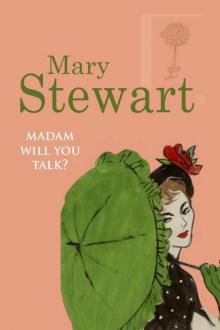 Madam, Will You Talk?
Madam, Will You Talk?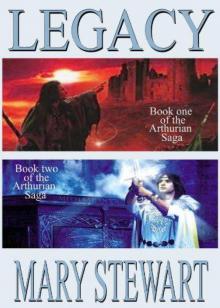 Legacy: Arthurian Saga 1-4
Legacy: Arthurian Saga 1-4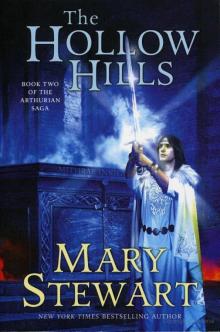 The Hollow Hills
The Hollow Hills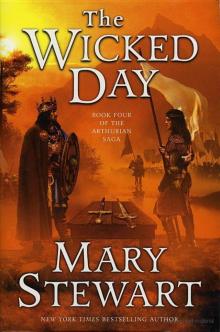 The Wicked Day
The Wicked Day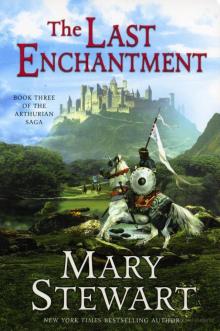 The Last Enchantment
The Last Enchantment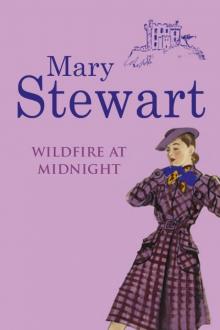 Wildfire at Midnight
Wildfire at Midnight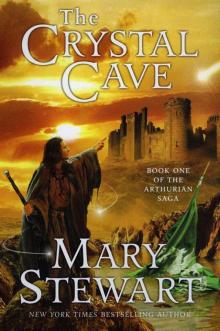 The Crystal Cave
The Crystal Cave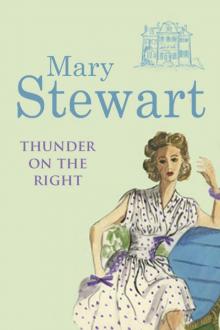 Thunder on the Right
Thunder on the Right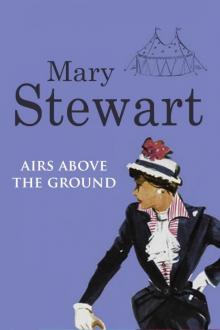 Airs Above the Ground
Airs Above the Ground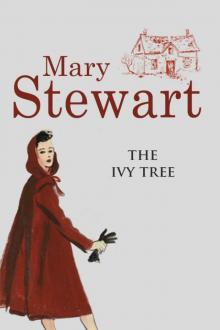 The Ivy Tree
The Ivy Tree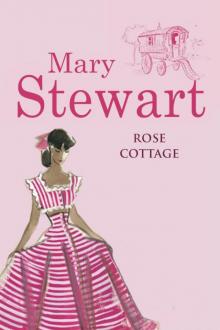 Rose Cottage
Rose Cottage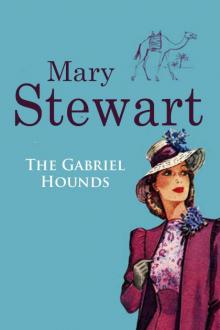 The Gabriel Hounds
The Gabriel Hounds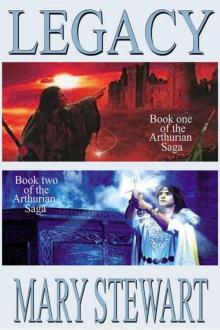 Legacy: Arthurian Saga
Legacy: Arthurian Saga The Wind Off the Small Isles
The Wind Off the Small Isles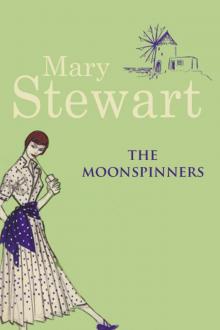 The Moonspinners
The Moonspinners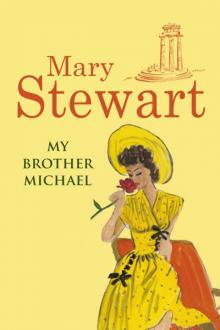 My Brother Michael
My Brother Michael The Prince and the Pilgrim
The Prince and the Pilgrim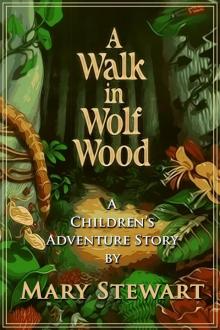 A Wlk in Wolf Wood
A Wlk in Wolf Wood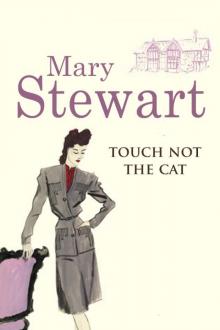 Touch Not the Cat
Touch Not the Cat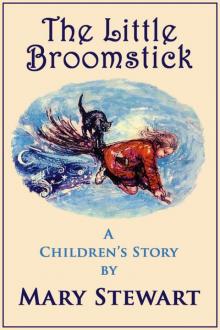 The Little Broomstick
The Little Broomstick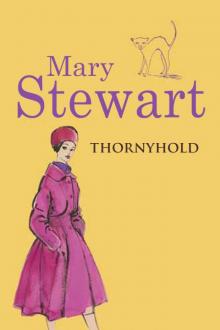 Thornyhold
Thornyhold This Rough Magic
This Rough Magic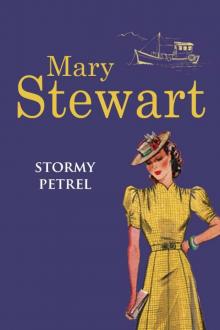 The Stormy Petrel
The Stormy Petrel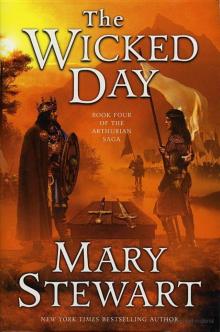 Wicked Day
Wicked Day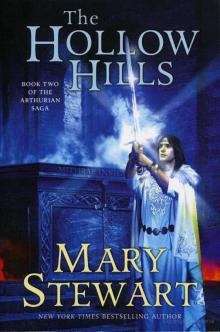 Hollow Hills
Hollow Hills WILDFIRE
WILDFIRE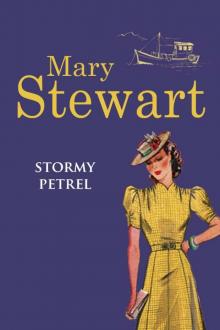 Stormy Petrel
Stormy Petrel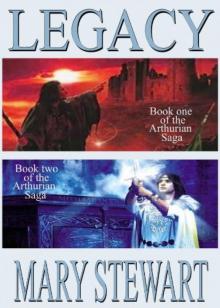 Legacy
Legacy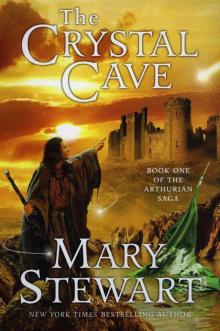 Crystal Cave
Crystal Cave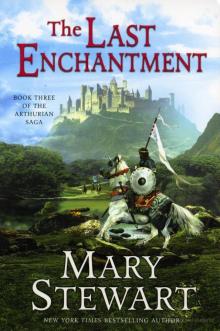 Last Enchantment
Last Enchantment